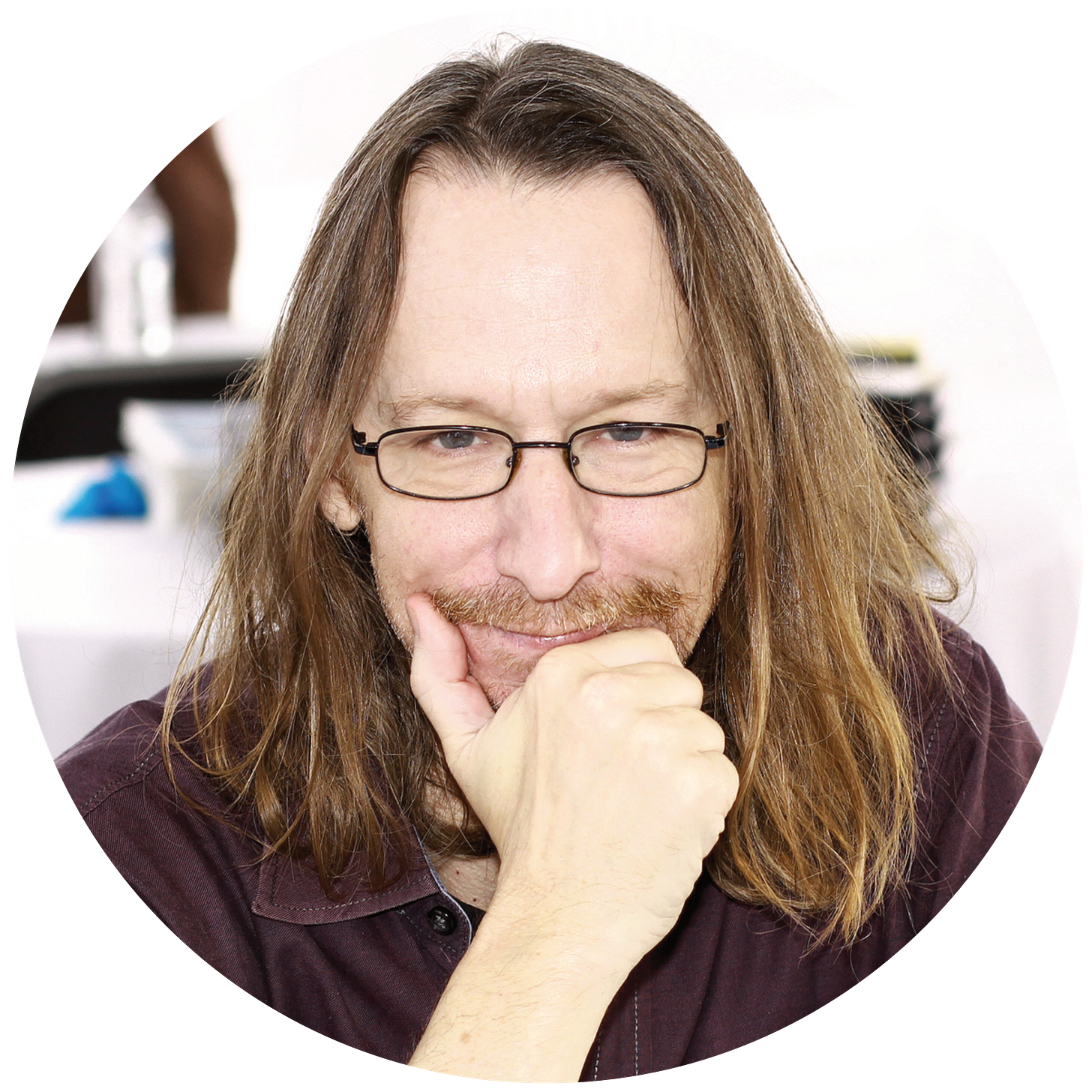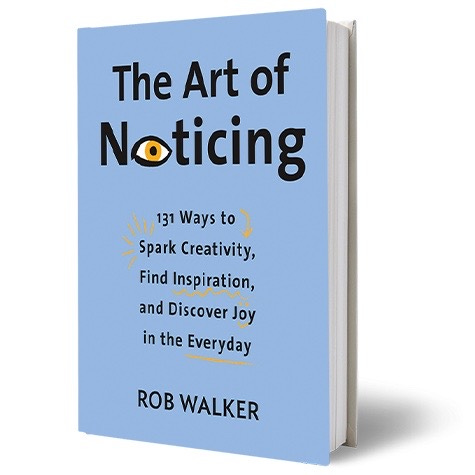Robert Walker’s superpowers are curiosity and observation. You could call him a professional noticer. Not only does he engage a keen sense of awareness in the minutia of his surroundings, he’s inspiring the rest of us to pay as much attention to our world around us as we do to the smart electronic portal in our pockets (or hands, bag, bra, etc). His 2019 book The Art of Noticing: 131 Ways to Spark Creativity, Find Inspiration, and Discover Joy in the Everyday, is a guide for cultivating creativity and engaging with your world.
But wait.
There’s more.
He pens an amazing newsletter of the same name that goes beyond the book. Three or four times a week he offers challenges, ideas, inspiration, prompts, ice breakers, links and all sorts of goodies to encourage people to really dig in to their surroundings. It’s kind of addicting, always being offered new worldview lenses.
Walker is on the faculty of the Products of Design MFA program at the School of Visual Arts. He’s been a columnist for The New York Times Magazine, the New Yorker, Medium, and Slate, among others. If you’re a regular NPR listener you’ve definitely heard him spilling some knowledge on material culture and branding. His 2008 book Buying In: The Secret Dialogue Between What We Buy and Who We Are informed my MFA thesis work.
He lives in New Orleans with his photographer and designer wife Ellen Susan and Russel, their Australian Shepard mix.
Rob and I chatted about his daily practice. He has over two decades of playing the work-from-home game.

Tell me about your day, start at the top.
I get up pretty early at this point. These things have all changed over the years and where I am now is I get up around 5:30 or 6. I spend a couple hours of the morning reading. I read a lot: the Times, the Wall Street Journal, I use RSS Feedly to read a bunch of blogs and other publications. I catch up on what’s happening out there and what I’m interested in. I use Evernote, so there are always a bunch of topics that I'm following. And I squirrel things away.
And then there’s a point where I’ve done all I need to. I’ve read so much. My big important part of the day is taking a break. I either bike or swim around mid-morning. After that huge intake of information, I try to pay attention internally to what I am coming back to, what’s sticking with me.
I have a pretty hard stop at six. I’m pretty strict about that, I don’t even look at email after six. The evening is devoted to either actual human contact, when that’s possible, or more reading. Reading things that are not online or connected to current events is important, too. I'm not as good at this. I’m one of those people who in the pandemic era has had more trouble reading books, like my attention span is just fucked up. I try to read a novel or the print New Yorker or New York Review of Books, I try to read stuff like that. Mentally, something that gets you out of the day. Part of what I’m doing in those situations, and you just wrote about this, is serendipity of trying to not just operate on chance but on informed, open minded, let’s cast the net out, and be open to unexpected connections.
What does the rest of your work day look like?
I would say that I work from about nine to six, but there’s a lot of playing in that, in the sense that I don’t go to an office. So, if I want to take my dog for a walk during that time I take my dog for a walk, or if I need to go shopping for something, I just do it. I don’t have a tremendous amount of discipline about that; my discipline is more oriented toward getting certain things done at certain times. I know that on Monday I want to get the newsletter out by six o’clock. So, maybe I can do that and still go to the grocery store. My process allows me to say I need to get away from the computer for now. I don’t always find it productive to work in the power-through-it mode. It doesn’t always work for me. Sometimes it’s better for you to go… I was going to say, “Go get your dry cleaning done” but I haven't had dry cleaning done in a year because I haven't needed to have anything even ironed in a year.
I have found that it’s more effective for me to give myself the break than to force myself like, I cannot get up from this machine until I’ve written eight paragraphs kind of hardcore discipline. My discipline is oriented more toward the deadline, so any time in between is fair game.
It’s clear through your writing, in your books and newsletters, that you’ve pretty much read everything on the internet. People are always sending you articles. How do you know when to pull back and say enough?
I am pretty serious about that six o’clock stop work thing. I’m not going to sit here all night reading. And also, having a switch to flip is helpful, which is more of a judgment call. I feed off the stuff that people send me and tell me about. But, as you might imagine people also send me and tell me about things that I don't like at all and don't interest me. I don’t mean anybody any harm or offense, but, at the end of the day I have to make judgments and I’m ruthless: if I don’t care-- I don’t care. I think this is really important. I’m interested in a lot of things, like a lot, and that can be a problem. But I’m also very determined about things that I’m not interested in. If I’m not interested: I’m not interested. Then I turn away, because it’s never going to end up being productive. There are people who I like who want me to get engaged in things that just don’t connect with me. I’ve been on the other end of it, trying to get people interested and they don’t care. You have to sort of accept that that’s how people are. There’s an instinct thing going on there that you just have to learn to trust and it takes a little time to learn to trust your own instincts.
How do you remember and store and organize everything you read?
I’ve used Evernote for a while. As a journalist, I wrote a story about the company. In the course of that I started using the product, it happened to work well with the way that I work. So, it’s been useful.
I have a lot in there, and that can be a problem. It can become just a wasteland of stuff, and I’m sure there’s stuff in there that I’ll never see. I periodically try to clear this out. But that seems like a fool’s errand. I tried to be efficient and productive but I also tried to embrace the idea: Look, there's some stuff in there. It’s just gonna fall away.And that’s okay, I'm going to lose some ideas, maybe even some ideas that in some version of heaven, they can show me:look, here’s the thing you could have done. Maybe that's how I’m willing to admit that there will be some things that I lost. But what can you do?
Different people use different things and I don’t know that there’s a one true solution for anybody but I found something that worked for me better than whatever I was doing before, which was basically Word files, and are unwieldy to say the least.
Let’s talk about writing.
I’d describe the way that I write, and I don't know how much this is true for other people, the early writing happens in my head, like I’m rehearsing. So, I start thinking about what’s the first line of the piece going to be so that I have it in my head when I sit down to the computer. That’s what I’m doing when I’m swimming, I’m turning over in my head how I’m going to start a piece. That to me is writing. I’m not physically writing, I’m thinking. The first rough draft happens while I’m walking the dog or doing whatever. And then you know, it doesn't always work when you do that, but it gives you something so when you sit down you can just go.
There’s this part of the writing process that is away from the writing, where you’re just thinking, and that's really important: what am I trying to say?, how do I start?, and how do I end? Sometimes it’s better to do that away from the computer.
To me it’s all work. I have a lot of boundary issues, my life is this stuff. Everything I do, even my hobby, is another writing project. It’s all the same stuff, it’s all a continuum.
I'm sort of goofing off a lot but I sort of feel like a lot of that goofing off time is strategic. But that the work never goes away. I think that’s true if you’re serious about whatever it is you’re doing. That’s always going to be true: the work is not going to go away because it matters to me. I try to do things that matter to me. Even when they’re dumb, even when they fail. I’m always trying to do something that matters to me at least, like it’s sincere, I’m trying. And I think that's the best you can ask for.





